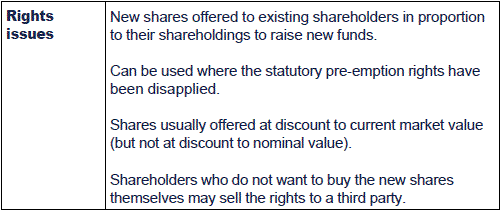Share capital
Definition
A share is 'the interest of a shareholder in the company measured by a sum of money, for the purpose of a liability in the first place, and of interest in the second, but also consisting of a series of mutual covenants entered into by all the shareholders':
In simple terms 'a share' refers to the investor having a share of the ownership of the business and the value (profits) generated by that business.
There are, however, a number of different types and class of shareholding that mean this definition can not be applied on a universal basis.
Types of shares
Ordinary shares
Ordinary shares provide evidence of ownership of the company. They are a part of the equity of the business. This entitles the shareholder to a vote at the annual general meeting (AGM) and a share of the residual assets of the company once it is wound up.
The residual assets are those that are left when a company ceases to trade and all its assets are sold off and all liabilities settled.
Ordinary shareholders are not entitled to a dividend; these are paid at the discretion of management. Ordinary dividends should be paid after preference dividends.
Other pages in this knowledge bank look at the practicalities of raising equity (as opposed to the legal aspects).
Preference shares
Preference shares do not evidence ownership in a company and for that reason carry no voting rights. They are a hybrid instrument, meaning that they have the attributes of both loan capital and equity share capital. There are two common forms of preference share:
redeemable preference shares: these have a fixed repayment date (much like a loan), and
irredeemable preference shares: these have no fixed repayment date (much like ordinary share capital).
In both cases the dividend payable to the preference shareholder can either be fixed (i.e. like an annual interest charge on a loan) or it can be at the discretion of the directors.
Preference shareholders do not share the residual assets of the company. They are repaid their share capital out of the assets of the company before the final residual assets are distributed to the ordinary shareholders.
Class rights
Class rights are the special rights attached to each class of shares, such as dividend rights, distribution of capital on a winding up and voting.
The procedure for varying class rights depends on whether any procedure is specified in the articles:

Minority protection
Under S633 CA06, the holders of 15% of the nominal value of that class, who did not consent to the variation, may ask the court to cancel the variation within 21 days of the passing of the resolution.
The court may confirm or cancel the variation. However, it will only cancel the variation if the petitioner proves it is unfairly prejudicial.
The court draws a distinction between:
- a variation that affects the value, enjoyment or power derived from the rights and
- a variation that changes the rights themselves.
The court will only intervene in the latter case.
Terminology



Issuing shares
Allotment of shares
This is where the shares are allocated to a person under a contract of allotment. Once the shares are allotted and the holder is entered in the register of members, they become a member of the company.
Authority
The directors need authority in order to allot shares. This may be given:
- by the articles, or
- by passing an ordinary resolution.
The authority must state:
- the maximum number of shares to be allotted
- the expiry date for the authority (maximum five years).
The directors of a private company with only one class of shares may allot shares of that class unless it is prohibited by the articles: S550 CA06.
Issue at discount
Every share has a nominal value which is fixed at the time of incorporation of the company in the statement of capital and initial shareholding. The nominal value of the share represents the extent of a shareholders potential liability.
The common law rule is that a company cannot issue its shares for a consideration which is at a discount on their nominal value.
The common law rule is given statutory effect in S580 CA06. In addition S582 CA06 states that shares are only treated as paid up to the extent that the company has received money or money's worth.
If this rule is breached the issue is still valid, but the allottee must pay up the discount plus interest. This applies to any subsequent holder of such a share who was aware of the original underpayment: S588 CA06.
Issue at premium
Where a share is allotted at a value greater than its nominal value, the excess over the nominal value is share premium. This is where the market value of the share is greater than the fixed nominal value.
S610 CA06 requires any premium to be credited to a share premium account, which may only be used for:
- writing off the expenses of the issue of new shares
- writing off any commission paid on the issue of new shares
- issuing bonus shares.
Paying for shares - private companies
Private companies may issue shares for non-cash consideration. The court will interfere with the valuation only if there is fraud or the consideration is 'illusory, past or patently inadequate'.
Paying for shares - public companies
There are a number of additional rules relating to the issue of shares in public companies contained in CA06:

|
Created at 8/21/2012 12:10 PM by System Account
(GMT) Greenwich Mean Time : Dublin, Edinburgh, Lisbon, London
|
Last modified at 11/14/2012 3:20 PM by System Account
(GMT) Greenwich Mean Time : Dublin, Edinburgh, Lisbon, London
|
|
|
|
 |
Rating
:
|
 Ratings & Comments
(Click the stars to rate the page) Ratings & Comments
(Click the stars to rate the page)
|
 |
Tags:
|
|
|
|
|